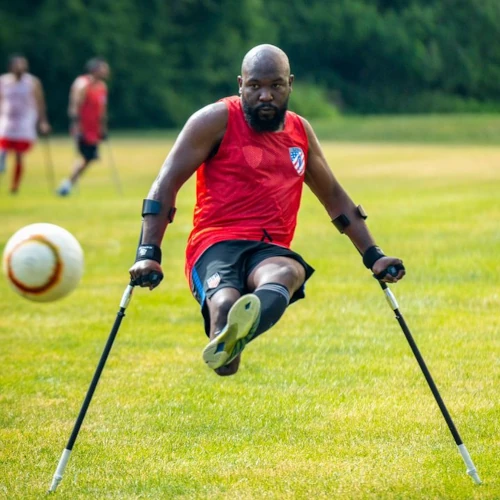
The second annual US Amputee Soccer Cup goes down this weekend in Cambridge MA, just across the river from Boston. The field has expanded to five teams this year, with Miami joining the returning clubs from New England, New York, Chicago, and Denver. New England won last year’s inaugural tournament, beating New York in the championship match, and both of those rosters will be loaded again for the 2024 US Cup.
Although this is a co-ed event, most members of the US Women’s amputee national team are sitting it out to prepare for the Women’s Amputee Soccer World Cup, which commences in just three weeks in Baranquillo, Colombia. But almost every member of the men’s national team will be in action this weekend, including familiar faces like Nico Calabria, Jovan Booker, and Carlos Ayala. Plenty of less recognizable players will be on the pitch, too, reflecting the rapid growth of amputee soccer and the diverse group of athletes who are getting involved in the sport.
Below we’ve highlighted a handful of less heralded players who we think will be competing in Cambridge this weekend. For a complete schedule of US Amputee Soccer Cup matches, visit the American Amputee Soccer Association’s web page. You can watch every match live on the AASA’s YouTube channel, and of course there are a lot of great interviews at Amputee Soccer Rising, the podcast Amplitude is co-producing with the AASA.
Musabwa Nzirimwo, New England: Two years ago, the then-18-year-old Nzirimwo scored Team USA’s lone goal at the 2022 World Cup. Now 20, the Congolese native has established himself as the US roster’s most dangerous weapon and one of the fastest amputee soccer players in the world. He netted three goals in last year’s US Amputee Soccer Cup and won the Golden Boot award as the tournament’s best player.
Redondo Richard, Miami: Also known as El Principe (The Prince), Richard forms half of an explosive scoring tandem with Saviola Charles. Both players scored nine goals for Team Haiti in the 2022 Amputee World Cup, leading their team to a fourth-place overall finish in that tournament. Playing against Team USA in a World Cup match, Richard scored four goals for Team Haiti and assisted on two others in a 6-2 victory that propelled his team into the quarterfinal round.
Vasu Sojitra, Colorado: This player squeezes soccer into a schedule already jam-packed with ambitious athletic endeavors. An advanced mountaineer, Sojitra is the first amputee to ascend Grand Teton on crutches and to descend Denali on skis. He’s also a fierce advocate for disability inclusion in sports and elsewhere in society, which is one reason National Geographic named him a Traveler of the Year for 2024. Sojitra played for Team USA in the ‘22 World Cup and will be traveling to Honduras next month as the team competes in the Gold Cup tournament.
Ermin Omerovic, Chicago: The Bosnian native made international headlines five years ago as a beta tester for a brain-controlled bionic arm. Now 24, Omerovic has emerged as one of the top amputee goaltenders in the US. Although he didn’t make the national team’s roster this year, he left a strong impression this spring at US Soccer’s “Adapt and Thrive” invitational event for adaptive players. By the time the men’s amputee World Cup takes place in 2026, Omerovic might have a significant role for Team USA.
Jordan Obernesser, Colorado: At just 15 years old, Obernesser is the youngest player on the US national amputee soccer team and one of the youngest national-team players in the world. He also represents the significant growth of amputee soccer among kids and teens, who’ve been flocking to clinics and camps all over the country. Obernesser, an elite player who earned his Team USA roster spot on the merits, is someone to take note of. He’ll likely be a big part of amputee soccer’s continued growth for years to come.
Greg Smith, Chicago: The 40something Smith isn’t vying for a spot on Team USA or making preparations for World Cup glory. We’re highlighting him because he represents the majority of the players who’ll be competing this weekend in Boston. A recent below-knee amputee due to traumatic injury, Smith declined the initial invitations to try out the sport. He was still processing his emotions. But Smith eventually asked himself: “Am I going to sit around the rest of my life and be bummed about it, or am I going to be positive and accept my new life as an amputee?” He showed up for soccer practice one day at Adaptive Sports Connection in Columbus, Ohio, and now the game is a regular part of his adaptation to limb loss. There are thousands of other Greg Smiths out there, who might benefit physically and emotionally if they gave amputee soccer—or some other adaptive activity—a chance.